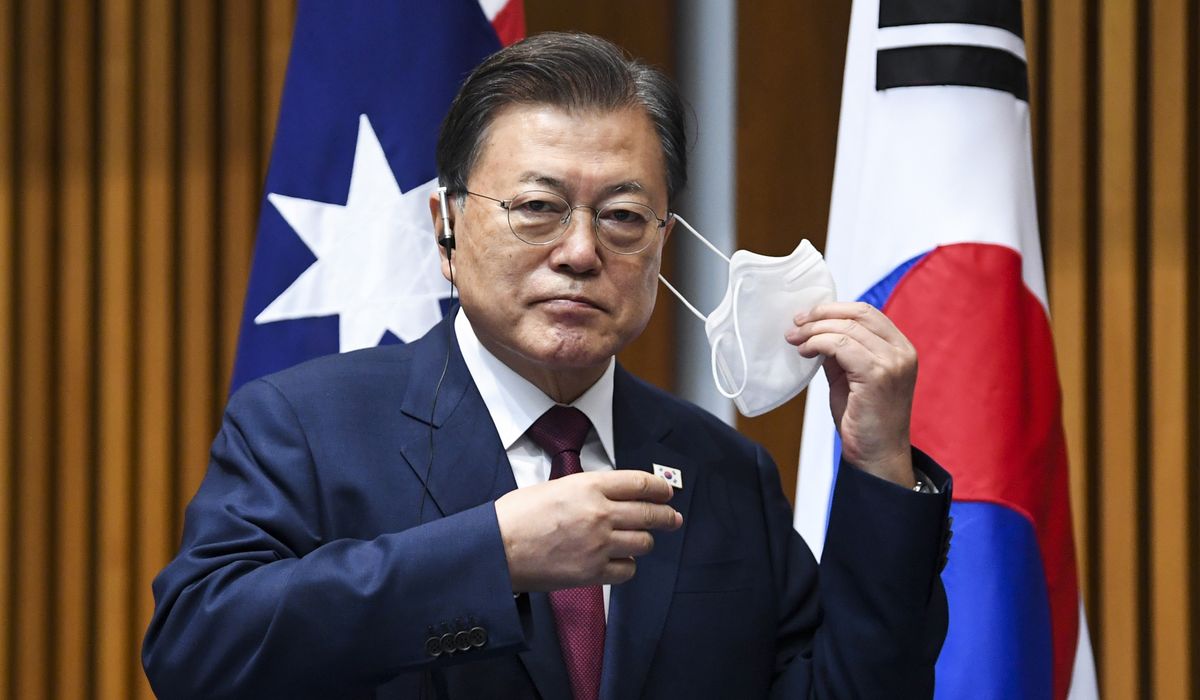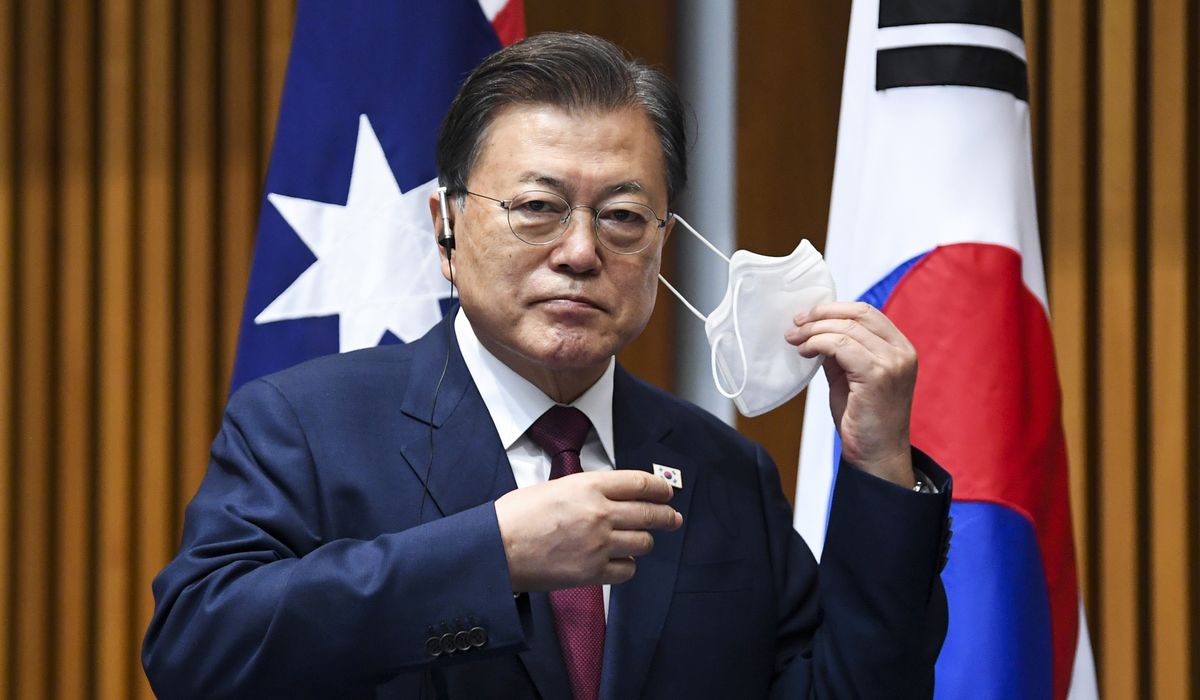
President Biden’s diplomatic boycott of the Beijing 2022 Winter Olympic Games is struggling to find recruits just a week after its launch, with close U.S. allies around the world rejecting the effort and in some cases publicly bashing it.
South Korea on Monday became the latest nation to say no, raising serious questions about America’s ability under Mr. Biden to rally its friends to a common cause against a prime Chinese national priority.
The announcement also offered more proof of Beijing’s massive economic power in Asia and beyond. Its significant investments and construction projects around the globe have left some governments reluctant to join Washington in confronting the Chinese Communist Party head-on.
So far, only Canada, Australia and Britain have joined the U.S.-led diplomatic boycott. The four nations will send their athletes to the games but keep dignitaries and government officials home. The move stops short of a total boycott, but the Biden administration portrays it as a clear public condemnation of China’s human rights abuses, its provocations toward Taiwan and Hong Kong, and other aggressive steps in the region.
It’s unclear how many other nations will get on board. French President Emmanuel Macron has ruled out a diplomatic boycott and publicly questioned its effectiveness. Other officials across Europe on Monday condemned the very concept of politicizing the Olympics. Argentina issued a statement last week saying it would not observe a diplomatic boycott. Israel, one of America’s closest allies, seems to have ruled out a boycott as it nurtures its growing economic relationship with China, according to Israeli media reports.
South Korean President Moon Jae-in on Monday said flatly that a boycott isn’t on the table.
“Regarding the diplomatic boycott of the Beijing Olympic Games, South Korea did not receive any request to join it, and the government is not considering it,” Mr. Moon said during a press conference in Canberra alongside Australian Prime Minister Scott Morrison.
“Today’s state visit has nothing to do with China,” he said. “South Korea’s stance is that it is very important for the country’s national interest to expand the supply chain for key natural resources … as well as enhancing bilateral defense cooperation” between South Korea and Australia.
Japan has not announced whether it will join the boycott, though it has given mixed signals about following the U.S. lead. The decisions of South Korea and Japan are crucial to Washington’s effort to project a unified front against an increasingly aggressive and economically competitive China.
China has dismissed the boycott and made clear it does not expect many more countries to participate. Mr. Moon’s announcement suggests that Beijing may be correct. Analysts noted that China was a strong champion of South Korea’s successful bid to host the 2018 Winter Games in Pyeongchang, and Mr. Moon was under pressure to return the favor.
“It is a common consensus that Olympic sports are independent from politics, and the U.S. is going against such a consensus, which will only hurt itself,” Lu Chao, director of the Research Institute for Borderland at Liaoning Academy of Social Sciences, told China’s state-controlled Global Times in an article Monday.
In the case of South Korea, in particular, specialists say the top considerations are economic. About a quarter of all South Korean exports flow to China, making it Seoul’s top trading partner. Since 2005, China has directly invested more than $9 billion in South Korea, according to figures compiled by the American Enterprise Institute’s China Global Investment Tracker.
China’s ability to put economic pressure on its neighbors surely will factor into any decisions about the Olympics.
David Maxwell, a senior fellow at the Foundation for Defense of Democracies, said Seoul is “trying to walk the tightrope between the U.S. and China” and clearly fears economic retaliation from Beijing.
“I am sure South Korea, as do others, may also question … the boycott. Will it have an effect that will be worth the likely economic warfare it will suffer?” said Mr. Maxwell, a 30-year Army veteran who served extensively in Asia and closely tracks the region.
“If we want [South Korea] to support the boycott, then we need to make sure it knows that the U.S. will be committed to aiding [it] in defense of the Chinese economic warfare attack,” he told The Washington Times on Monday.
Home and abroad
It’s unclear whether any behind-the-scenes diplomacy took place before Mr. Moon’s public comments. In announcing the boycott last week, White House officials focused on objections to China’s human rights record, particularly accusations of ongoing crimes against its Uyghur minority in Xinjiang province.
“The Biden administration will not send any diplomatic or official representation to the Beijing 2022 Winter Olympic and Paralympic Games, given [China’s] ongoing genocide and crimes against humanity in Xinjiang and other human rights abuses,” White House press secretary Jen Psaki said last week. “We did not think it was the right step to penalize athletes who have been training, preparing for this moment. And we felt that we could send a clear message by not sending an official U.S. delegation.”
Mr. Biden’s announcement met with generally bipartisan support at home. Some China hawks in Congress faulted the president for not boycotting the games altogether.
Other nations share the U.S. objections to China’s role as host but have publicly questioned whether a diplomatic boycott is the most effective tactic.
Mr. Macron said a boycott carries little weight if the U.S. and its allies still send their athletes to Beijing.
“To be clear: You either have a complete boycott and not send athletes, or you try to change things with useful actions,” he said at a press conference last week, according to French media.
“We’re talking about something rather symbolic,” he said.
Austrian Foreign Minister Alexander Schallenberg, whose country is traditionally competitive in the Winter Games, said Monday that “politicizing” the Olympics “does not seem useful to me.” German Foreign Minister Annalena Baerbock suggested that Berlin won’t take part in a diplomatic boycott of the games.
Getting the 27-nation European Union to adopt a single get-tough approach to China has been stymied by reservations from some Eastern European nations. Hungary, for one, has cultivated Chinese markets and sought Chinese funding for infrastructure and business deals. An EU-wide boycott of the Olympic Games, diplomatic or otherwise, would require consent from every member.
The Israeli newspaper Haaretz late last week cited an unidentified senior Israeli official calling the diplomatic boycott “bizarre” and suggesting that the country has no intention of joining the effort.
Like other nations around the world, Israel has cultivated closer ties with China in recent years, especially in the economic realm. Since 2005, China has spent nearly $13 billion in direct investments and construction projects in Israel, according to AEI’s China Tracker.
• This article is based in part on wire service reports.








